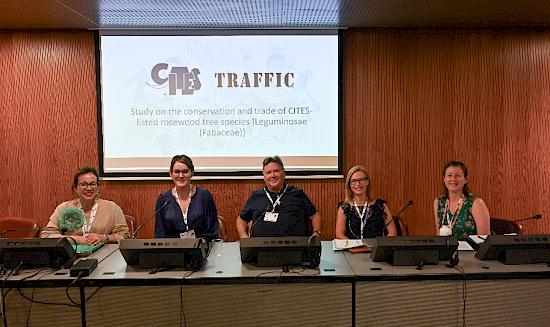New Guidance to protect priority Rosewood species in trade
’Rosewood’ is a commercial term encompassing a wide range of tropical hardwoods in the Fabaceae (Leguminosae) family. Rosewood trees are harvested and traded primarily for crafting traditional furniture and musical instruments. In support of the effort to ensure the harvest and trade of rosewood tree species is sustainable and not detrimental to the survival of this timber species in the wild, the Convention on International Trade in Endangered Species of Wild Fauna and Flora (CITES) has released a report at the 27th meeting of the CITES Plants Committee to guide CITES Parties engaged or planning to engage in sustainable harvest and trade of rosewood specimens.
CITES regulates the international trade of a wide range of rosewood tree species, including tree species of the genus Dalbergia Afzelia, Khaya and Pterocarpus, the majority of which are listed in Appendix II. This type of CITES listing includes species that are not necessarily now threatened with extinction but that may become so unless trade is closely controlled.
Non-Detriment Findings (NDFs) are a cornerstone sustainability requirement for continuing the global trade in CITES-listed species that supports livelihoods in countries where it grows and industries in production and destination countries.
Maria Isabel Camarena, Scientific Support Officer of the CITES Secretariat Science Unit, said: “Through robust scientific assessment NDFs reinforce our dedication to safeguarding global biodiversity and the benefits we derive from it.”
Evidence-based NDFs are a fundamental element of CITES to allow the trade in species, yet, at the same time, protect them from future extinction.”
Paola Mosig Reidl, TRAFFIC Co-Lead of Data, Research, and Enforcement Support.Using data compiled by TRAFFIC experts, CITES has released a report on the CITES-listed species traded as Rosewood. The report includes factsheets and case studies of existing Rosewood NDFs to aid range States in effective data collection and management plans.
This information is essential for CITES Scientific Authorities to make NDFs and determine the volume of timber of a CITES-listed Rosewood species in a given area that can be exported, without threatening the long-term survival of the species in the wild.
To make it easier for CITES Parties to find species information for making informed NDFs, the report compiles information on the species’: characteristics; role in the ecosystem; regeneration rates; threats; conservation status and global illegal and legal trade levels.
Ms. Mosig Reidl continues: “The information could be considered by Scientific Authorities in range States of the most traded CITES-listed rosewood tree species to inform their decisions on export quotas.”
“The report supports the capacity of CITES Parties to implement the Convention effectively and ensure that the harvest and trade in CITES-listed species occur sustainably, legally and in a traceable manner,” said Ms. Camarena.
Blueprint for strengthening the legality and sustainability of trade
Pterocarpus erinaceus (African rosewood) is native to West African countries and is one of the rosewood timber species most threatened by over-exploitation and illegal trade. Range States of Pterocarpus erinaceus are undergoing trade suspension recommendations under CITES due to concerns about the sustainability and legality of the trade.
The range States’ Scientific Authorities can now use case studies in this report to identify existing approaches to collecting national data needed for NDFs for Pterocarpus erinaceus and methods to estimate sustainable quantities of timber to be exported. This process is an essential requirement for Parties to resume legal international trade of Pterocarpus erinaceus.
Using this report as a basis, the CITES Secretariat will organise an in-person workshop from 2 to 6 September 2024 in Douala (Cameroon) specifically on this species. This builds on the international expert workshop in Nairobi, December 2023 focusing on NDFs for a range of species, and others such as the workshop organised by the German Federal Agency for Nature Conservation (BfN) and TRAFFIC and hosted by the Cameroonian Ministry of Forests and Wildlife in Douala, April 2024.
Launch by CITES Secretary-General Ivonne Higuero
 CITES’ efforts to support the sustainable governance of forest resources came to light when CITES Secretary-General Ivonne Higuero launched the report at the ‘CITES Rosewoods: The global picture’ side event at the 27th meeting of the CITES Plants Committee in Geneva, Switzerland on 9 July 2024.
CITES’ efforts to support the sustainable governance of forest resources came to light when CITES Secretary-General Ivonne Higuero launched the report at the ‘CITES Rosewoods: The global picture’ side event at the 27th meeting of the CITES Plants Committee in Geneva, Switzerland on 9 July 2024.
“The first global report on CITES rosewoods represents a defining moment for the future of these species. This comprehensive study represents an unprecedented collaboration, bringing together extensive data, expert insights, and strategic recommendations. It underscores our commitment to the principles of CITES and our shared responsibility to protect these precious species.”
Ivonne Higuero, CITES Secretary General
Notes:
CITES Secretariat Media Team | Email:
Convention on International Trade in Endangered Species of Wild Fauna and Flora (CITES)

The Convention on International Trade in Endangered Species of Wild Fauna and Flora, is an international agreement between governments that aims to ensure that international trade in specimens of wild animals and plants does not threaten their survival. Find out more here.





